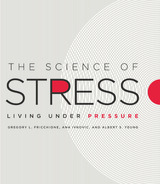
Families today are experiencing untold pressures and are expected to shoulder enormous burdens at a time when resources for support are becoming ever scarcer. This important book examines the effects of stress on both children and parents and explores various strategies for coping.
The authors—experts in child health and development and in business and social policy—emphasize that the problems of the family and of its members cannot be considered individually. They view the family as a dynamic system whose health is vitally related to its internal relationships and its interactions with other social networks. Stress in this context can be either a positive or a negative influence on the family’s effectiveness in raising children, depending on the personal and public resources available.
The strength of the book lies in its integrated approach to a many-sided problem. The authors provide reviews of research, clinical applications, and theoretical discussions, including several frameworks for understanding the constellation of factors within the family that affect children’s development. They examine specific situations that can present families with formidable challenges: unemployment, divorce, two-career families, single parenthood,teenage pregnancy, demands from the workplace. Some of these situations are traumatic but brief; others, such as chronic illness, require long-term coping strategies. The authors show the similarities that underlie these stressful situations—how they can affect the fabric of family life and the development of the young child.
The emphasis throughout the book is on policy implications: the urgent need for more enlightened and supportive corporate and government involvement. Unless we make the well-being of the family a priority, the number of children in adverse situations will continue to increase. This book will serve as an indispensable guide to psychologists, pediatricians, psychiatrists, educators, business executives, and government officials.


As Fricchione and his colleagues show, alleviating stress is a task that no one physician can alleviate for us on his own. It is not the sort of problem that a surgeon can excise with a scalpel or an internist can eradicate with antibiotics. It requires everyone’s efforts—the healthy, the sick, doctors, nurses, psychologists, clergy, community leaders, and everyone else—to pull together to address the stress-induced drivers in our community that undermine our health. Clearly and accessibly exploring the latest in modern neuroscience and immunology, the authors examine what those drivers are and how they reduce the body’s metabolic reserve, making us more vulnerable to illness. They then look at the antidote: enhanced resilience, something we can achieve by smartly adjusting how we face the significant adversities that can spring up in so many facets of our lives.
Offering innumerable insights on the personal and social causes of stress and the physiological effects they have, this book serves as an essential guide to show us how to alleviate stress and properly take care of ourselves. In doing so, it offers a crucial first step toward meeting the biggest health challenge of this century.
READERS
Browse our collection.
PUBLISHERS
See BiblioVault's publisher services.
STUDENT SERVICES
Files for college accessibility offices.
UChicago Accessibility Resources
home | accessibility | search | about | contact us
BiblioVault ® 2001 - 2024
The University of Chicago Press









